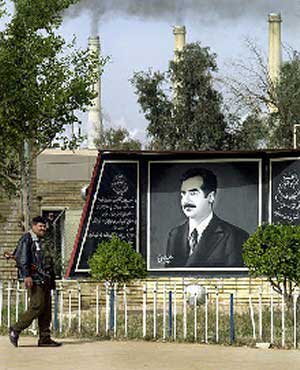
An Iraqi soldier walks in front of a portrait of Iraqi President Saddam Hussein and smoke stacks of a power station in Al-Musayyib, 60 kilometers (37 miles) southeast of Baghdad while U.N. weapons inspectors, unseen, investigate inside Friday Feb. 21, 2003. (AP Photo/Ali Mohammed) |
UNITED NATIONS - In a
blow to Iraq's military, chief U.N. inspector Hans Blix is expected to
demand the destruction of Baghdad's Al Samoud 2 missiles and machinery
to produce missile motors, diplomats and U.N. officials said Thursday.
Blix will send a letter to Iraq on Friday with his decisions, said Ewen Buchanan, spokesman for the chief inspector. It was not certain whether Blix would also recommend the destruction of 380 illegally imported rocket engines, which could be used for the Al Samoud 2. Destroying the Al Samouds would present a serious dilemma for the government: It would be giving up a valuable weapons system just as it faces the possibility of a U.S.-led invasion, but if it doesn't destroy the missiles it will be accused of failing to cooperate with U.N. inspectors. The United States has demanded the destruction of missiles and any other components that exceed the 150-kilometer, or 93-mile, missile range set by a 1991 Security Council resolution. A U.S. official in Washington said a new U.N. resolution that would give a green light to use military force to disarm Iraq was expected to be presented to the Security Council on Monday, but the timetable might slip by a day or two. |